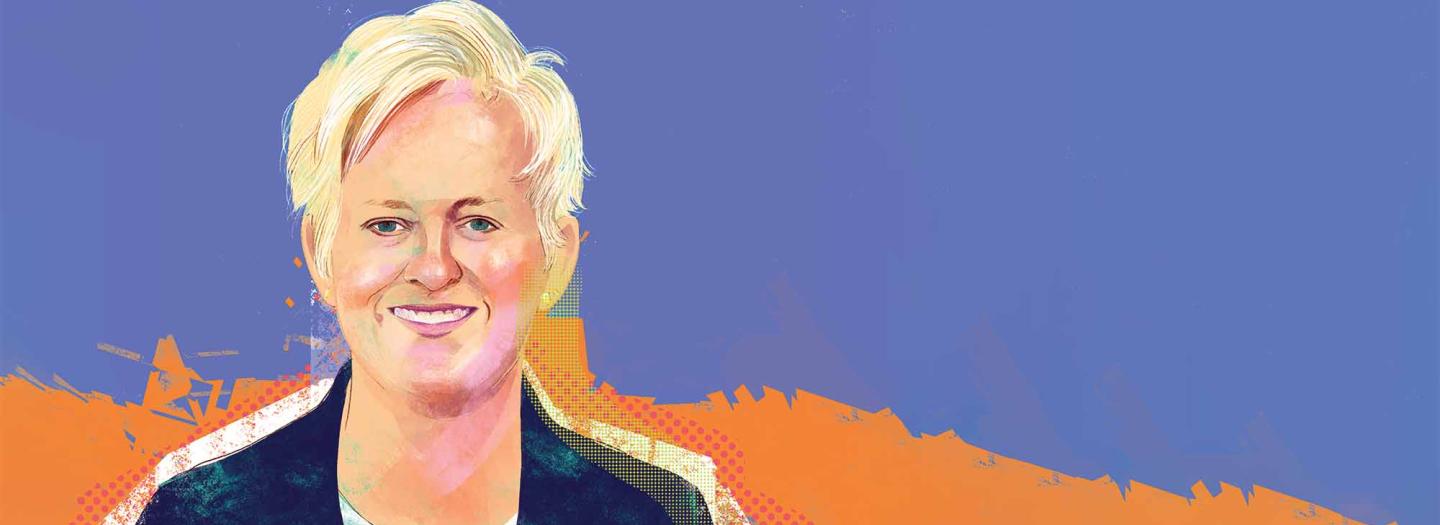Carol Camlin, PhD, MPH, Postdoc Alum : Studying mobility and HIV in Africa while cultivating the next wave of researchers
The UCSF Graduate Division Alumni Association Board of Directors is honored to announce the 2023 Alum of the Year: Carol Camlin, PhD, MPH, Postdoc Alum.

For Carol Camlin, PhD, MPH, Postdoc Alum, mentorship has value as a pursuit that’s both social and intellectual.
“I take great pleasure in seeing my trainees and mentees succeed,” says Camlin, a professor in the Department of Obstetrics, Gynecology, and Reproductive Sciences at UCSF and the 2023 Alumna of the Year for the UCSF Graduate Division. “I love the experience of seeing people grow and develop. And it’s intellectually interesting to me to think about the processes through which people learn and grow and develop.”
At UCSF – Camlin’s home base since 2008, when she arrived in the Bay Area to begin her postdoctoral work – she uses a combination of behavioral sciences, population studies, and sociology to examine human mobility and HIV prevention and care outcomes in Eastern Africa. Mentorship has allowed her to cultivate collaborators and successors who can further develop the work.
“There’s a kind of a spark and an interchange of ideas,” Camlin says. “I will have the seed of an idea, a mentee will have a seed of an idea, and it can productively become an area of research that they’re pursuing and I can support them.”
Those she has worked with say she is a skilled and caring mentor.
“We have all benefited tremendously from her dedication to mentorship, her honest and constructive feedback, and her focus on developing the next generation of HIV prevention researchers,” a group of 10 protégés wrote in nominating her for the award. “She does the work every day to create opportunities and mentor those who are traditionally underrepresented in the sciences.”
Inspired by Parents and Mentors
Camlin grew up in the Carolinas, the daughter of a public school art teacher and a Methodist minister who later did other service work.
“They really valued education for me and my sisters and doing work that has social value,” she says.
She completed a BA in English and German at Oberlin College in 1987. In the early 1990s, she was living in Boston, where the HIV epidemic was having a dire impact on her friends and community – and that led to her decision to work in AIDS education and activism.
“The HIV epidemic affected me personally and propelled me into a career in public health,” she says.
After earning a master’s of public health from the University of North Carolina at Chapel Hill and completing an internship at the Centers for Disease Control and Prevention, she decided to go to Africa, where the HIV epidemic began and was continuing full force.
She spent two years working at a research center in KwaZulu-Natal, South Africa. “It was that experience that interested me in academic research,” she says. “Although I hadn’t planned on working in academia, I realized that it was the right place for the applied, engaged work I wanted to do.”
Her next career stops were to earn a PhD from the University of Michigan School of Public Health and do a postdoctoral fellowship at the UCSF Center for AIDS Prevention Studies (CAPS).
“UCSF was a center of HIV research globally and in the country,” Camlin says. “I knew that I would get terrific training and the support that I needed to become an independent researcher.”
Camlin cites in particular the mentorship of Craig Cohen, MD, MPH, a professor in the UCSF Department of Obstetrics, Gynecology, and Reproductive Sciences, who “helped provide the kind of infrastructure that facilitated my entrée into work in Kenya”; Diane Havlir, MD, the Robert L. Weiss Memorial Professor for HIV/AIDS Research and chief of the UCSF Division of HIV, Infectious Diseases, and Global Medicine, whose “collaboration was a launching pad for a lot of my most important research”; and Edwin Charlebois, PhD, MPH, a senior scientist at CAPS, who remains “a very close collaborator and co-investigator in my studies.”
Her mentors at UCSF gave her further direction and deeper focus – she headed to East Africa, where she worked in Kenya on HIV risks faced by migrating women, who had been understudied compared with mobile men. Much of her subsequent work stemmed from this focus.
“HIV started around the Lake Victoria Basin in eastern Africa, in these very communities where we were working,” she says. “A very high prevalence has persisted to this day in many of these areas. That’s why we’re continuing to work to reach those who have not yet been reached by existing programs and services, in order to end the epidemic.”
Her work calls for gaining the trust of local communities and working closely with – and training – local researchers. She has benefited in that effort from the mentorship of Elizabeth Bukusi, MBChB, MD, MPH, PhD, co-director of the UCSF-Kenya Medical Research Institute’s Research Care and Treatment Program.
“A lot of my success has been the consequence of working with wonderful partners in Kenya and Uganda,” Camlin says.
Following Values and Passions
Camlin’s daughter, Cecilia, is now in college in Washington State, where she is studying history and film; she hopes to study abroad in Denmark next year.
While Camlin is not sure what her daughter will end up doing with her training, as someone whose undergraduate studies were in the humanities at a Midwestern college, but who ended up as a medical researcher halfway around the world from where she began, Camlin can attest that long-term clarity may not be the most important thing.
“I say to my mentees, you don’t really have to have a grand life plan,” she says. “You only really have to know what you want to do next. As long as you’re true to your values and your passions, it all just sort of unfolds naturally.”